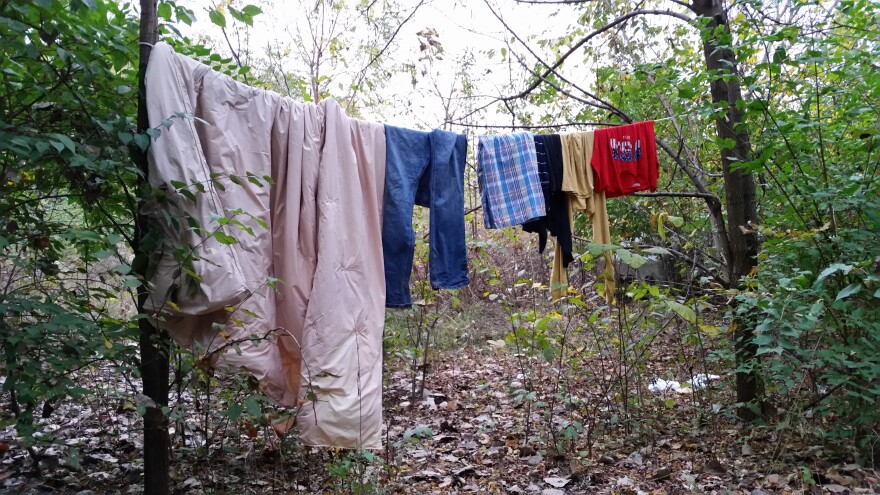Just east of downtown Louisville is a campsite, tucked in difficult-to-access woods not far from Campbell Street.
Broken glass and plastic cups are scattered across the winding footpath that leads over railroad tracks, up a small embankment and, eventually, to a clearing packed with a handful of tattered tents.
Piles of empty cans and dirty clothes are strewn about. The nearby fence encircling an auto scrap yard does little to drown out the clangs and bangs of crushing steel. Piles of feces sit nearby, and the stinging stench of urine hangs heavy in the still air.
This place is known to Louisville advocates for the homeless as "Campbell Camp." For some of those who choose not to spend nights in Louisville's shelters, the camp is a haven. Here they have shelters that belong just to them, not to mention camaraderie and a hint of privacy.
Shortly after sunrise on Thursday, Jason Caudill flings open the tattered entrance of his tent and peeks his head out.
The night before, like many, came and went with little sleep. Passing trains mixed with the constant bother of mosquitoes and spiders make nodding off, and living here, tough.
He pulls on a pair of dirty socks, lights a cigarette and takes a deep drag.
"Wish I could be in a house," he says.
Caudill, 35, has been homeless since he moved to Louisville from California a few months ago. He's a recovering drug addict and has neither a job nor government benefits.
Originally from Eastern Kentucky, he moved to Louisville to be closer to home. Also, he'd heard the city offers good support for homeless people — at least more than he could get in California.
He can spend his days at the St. John Center for Homeless Men or Phoenix Health Center For the Homeless. There, he meets with counselors who guide him through the process of getting off the street and into housing. He knows that process will likely be long, at least for him.
Caudill is not a veteran.
Louisville Metro government, nonprofits and other agencies this year turned their focus on getting hundreds of homeless veterans off the street and into housing. They've had some success, but their efforts mean that people with no military background, like Caudill, will have to wait.
“They served their country, they should get housing," he says. "But there’s like thousands more homeless people out here who’s not veterans that do need housing, I just wish there were more resources.”
But there aren't.
[soundcloud url="https://api.soundcloud.com/tracks/231748514" params="color=ff5500&auto_play=false&hide_related=false&show_comments=true&show_user=true&show_reposts=false" width="100%" height="166" iframe="true" /]
The lack of available affordable housing that could help thousands of homeless people get off the street and into a permanent living situation is "sad and disheartening," says Christopher Taylor, the Louisville field officer for the U.S. Department of Housing and Urban Development.
Due to thin resources, officials in Louisville are working in waves to fight homelessness, Taylor says. This year, the focus is on housing veterans.
Since January, officials have put 360 homeless veterans into permanent housing in Louisville. All remain in permanent housing, and some have became stable enough to relinquish their federal housing vouchers, opening more slots for others, Taylor says.
Next year, the focus will be on families with children, Taylor says. There are about 1,300 children living in shelters or on the street in the city, according to the 2014 Louisville Homeless Census.
After that, officials will turn their focus on single individuals, like Caudill.
"I can wait," he says.
Still, he doesn't want to wait years before he gets a chance to have a place of his own.
Finishing his cigarette, he thinks ahead to the coming winter. This will be his first cold season in Louisville since moving from California. His only shoes are a pair of sneakers. His sleeping bag is ripped and ragged.
A warm home and a soft bed are things Caudill says he hopes will come soon.
"I'm going to try to trust the process," he says.



